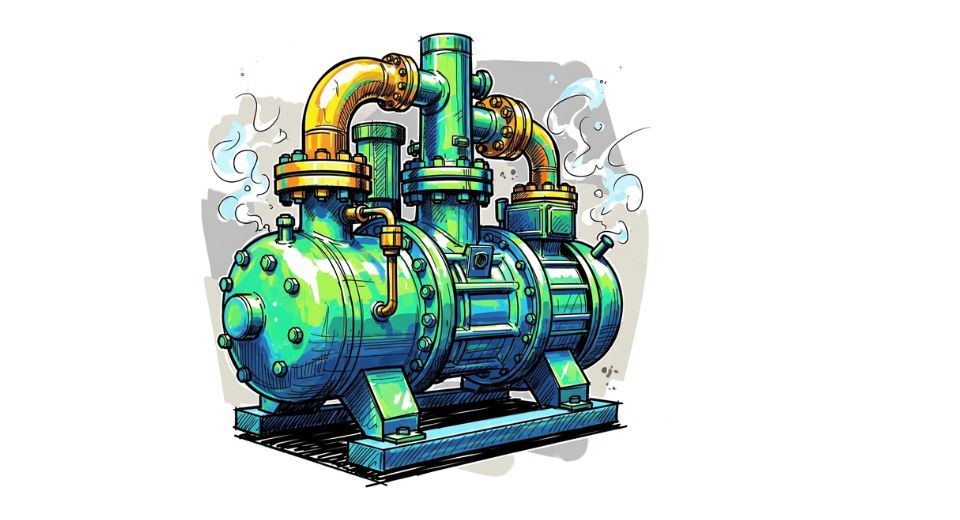
Aug 20, 2025

The Hydrogen Compressor Market Report by Metastat Insight highlights an industry that is assuming a clear space in the industrial and energy environments of today. The story of hydrogen as an energy carrier has been one of fascination for ages, but it is the spotlight on compression technology that makes the current vision of its commercial path stand out. Compressors are not a passive device but an active transition enabler, facilitating that hydrogen would be able to travel from points of production to utilization and storage regions with safety and efficiency. Absent this role, hydrogen would still be restricted from being integrated into infrastructures meant to deal with gases at certain pressures. With industries shifting focus toward decarbonization and clean sources of energy, the hydrogen compressor segment is at a crossroads where technology fineness and confidence in markets converge. Global Hydrogen Compressor market is estimated to reach $2,063.98 million in 2025 with a CAGR of 4.6% from 2025 to 2032.
The global Hydrogen Compressor Market is a mirror of stacked requirements that arise when sectors that are different interact with a common resource. Under industrial applications, compressors have to be able to take repeated use, surviving pressure cycles which differ based on end use. Conversely, energy transition projects focus on transportability and storage that call for flexible design. These diverging requirements do not split the market but rather broaden its scale to create innovations that speak to durability, flexibility, and economic feasibility at the same time. What looks initially like a technical requirement comes to show itself eventually as an area where engineering progress has a direct impact on the pace at which hydrogen technologies become more widely accepted.
Behind the exterior of this market is the issue of scale. Industrial gases have been managed with compression for generations, but hydrogen brings a set of distinctive properties that necessitate a rethinking of conventional practices. Hydrogen's molecular size, with its reactivity in particular conditions, results in traditional approaches not always being able to be replicated. The creation of compressors specifically geared toward hydrogen is evidence of the intersection of scientific rigor and commercial imperative. This duality guarantees that producers do not simply copy operating equipment but instead reform materials, sealing systems, and modes of operation to accommodate the unique properties of hydrogen. These changes illustrate how market value correlates with the ability to provide reliability under new technical requirements.
Geography is another dimension that is influencing the world Hydrogen Compressor Market. Hydrogen project spread is not limited to one region but rather happens through several national plans, industrial aggregations, and private ventures. Every environment poses different pressures, regulatory frameworks, and infrastructural preparedness. In areas where hydrogen is being incorporated into transport systems, compressors are engineered for refueling stations that need to provide quick, safe, and uniform performance. Concurrently, in industrial plants where hydrogen is utilized in chemical or refining operations, the focus is on resilience and limited downtime. Compressor manufacturers' capabilities to address this geographic and sectoral variation adds to the robustness of the market against homogeneity.
Alongside, however, the momentum of the hydrogen sector is followed by an examination of costs. As technical equipment, compressors are a big-ticket item. Their lifecycle costs including installation, upkeep, and operating power enter into end-user decisions. The winners in this market are those who are able to reconcile technical advancement with accessibility, with solutions that do not stay within the realm of high-capital initiatives but move towards mid-range and even distributed applications. On this level, the compressor market serves as a middle ground, bridging technical advancement and mass market accessibility.
The changing dynamics also promote alliances that merge the boundaries between manufacturer and user. Rather than seeing compressors as separate purchases, companies increasingly look for holistic solutions where suppliers not only offer equipment but also monitoring systems, maintenance procedures, and efficiency optimization. These services extend beyond the compressor, turning it from a mechanical device into an ongoing service, integrating it within operational plans rather than as a single purchase. This change not only solidifies client relationships but also steadies revenue streams, reinforcing sector maturity.
It is impossible to underestimate the symbolic importance given to hydrogen projects, tends to be cast in terms of a cleaner and more sustainable energy future. Compressors, as highly technical, hold a pivotal position in making those stories workable rather than wishful. They are not just machines that compress a gas; they are the infrastructure that takes policy aspiration, industrial strategy, and consumer demand and turns them into reality. Each leap in design, each gain in efficiency, and each addition in safety in hydrogen compressors drives the wider ecosystem that relies on secure handling of hydrogen forward.
The Hydrogen Compressor Market Report prepared by Metastat Insight eventually distills this multifaceted narrative into a lucidity that transcends technical readers. It highlights how the development of compressors is inseparable from universal aspirations, industrial revolutions, and the constraints of everyday use. By placing compressors in this broader context, the report reemphasizes their standing as greater than secondary equipment; they become tools that enable hydrogen strategies to transition from conceptual models into operational systems. By spotlighting this process, the report does more than follow a market it describes how an exact technical sector can shape the larger trajectory of energy and industry globally.
Drop us an email at:
Call us on:
+1 214 613 5758
+91 73850 57479